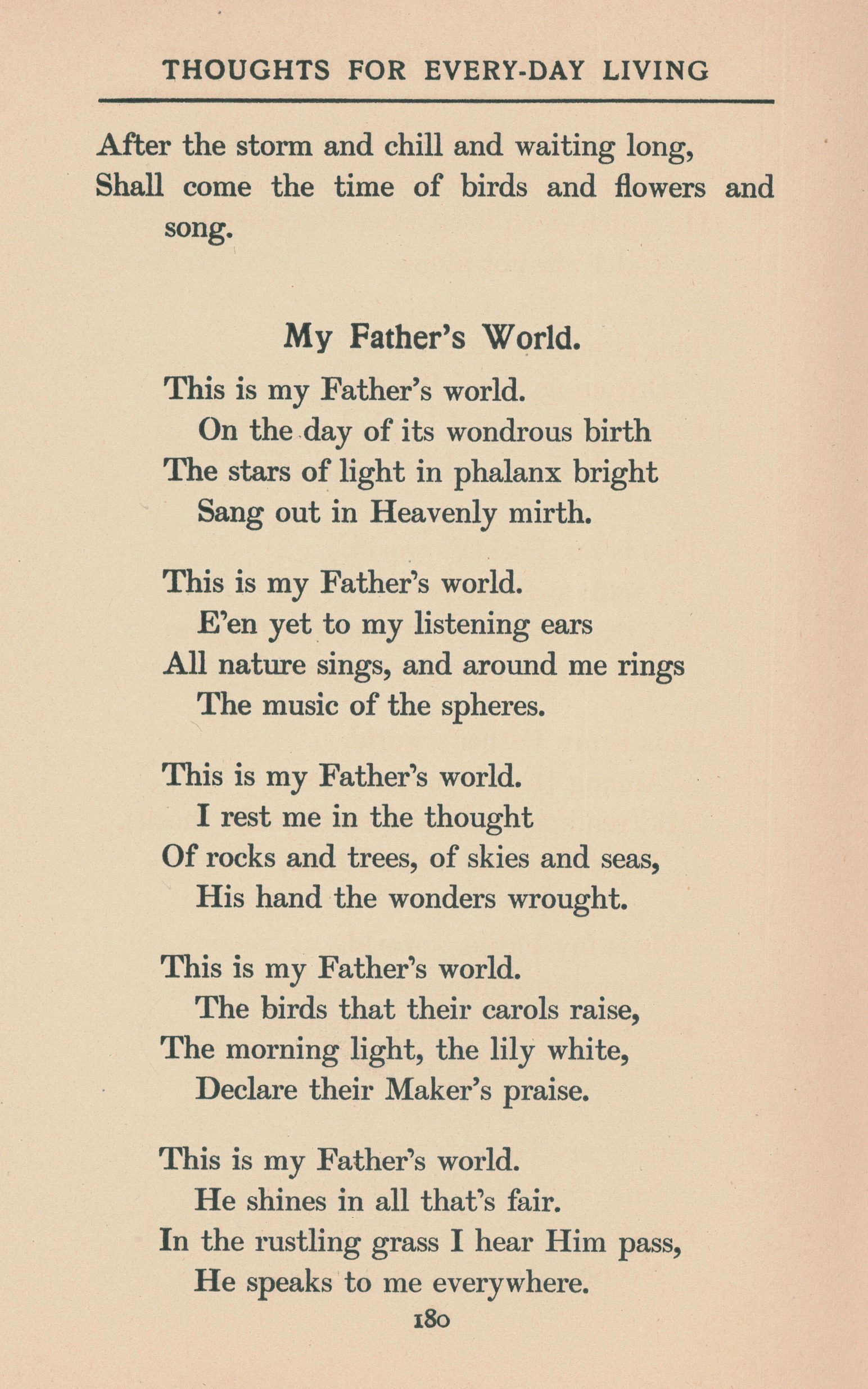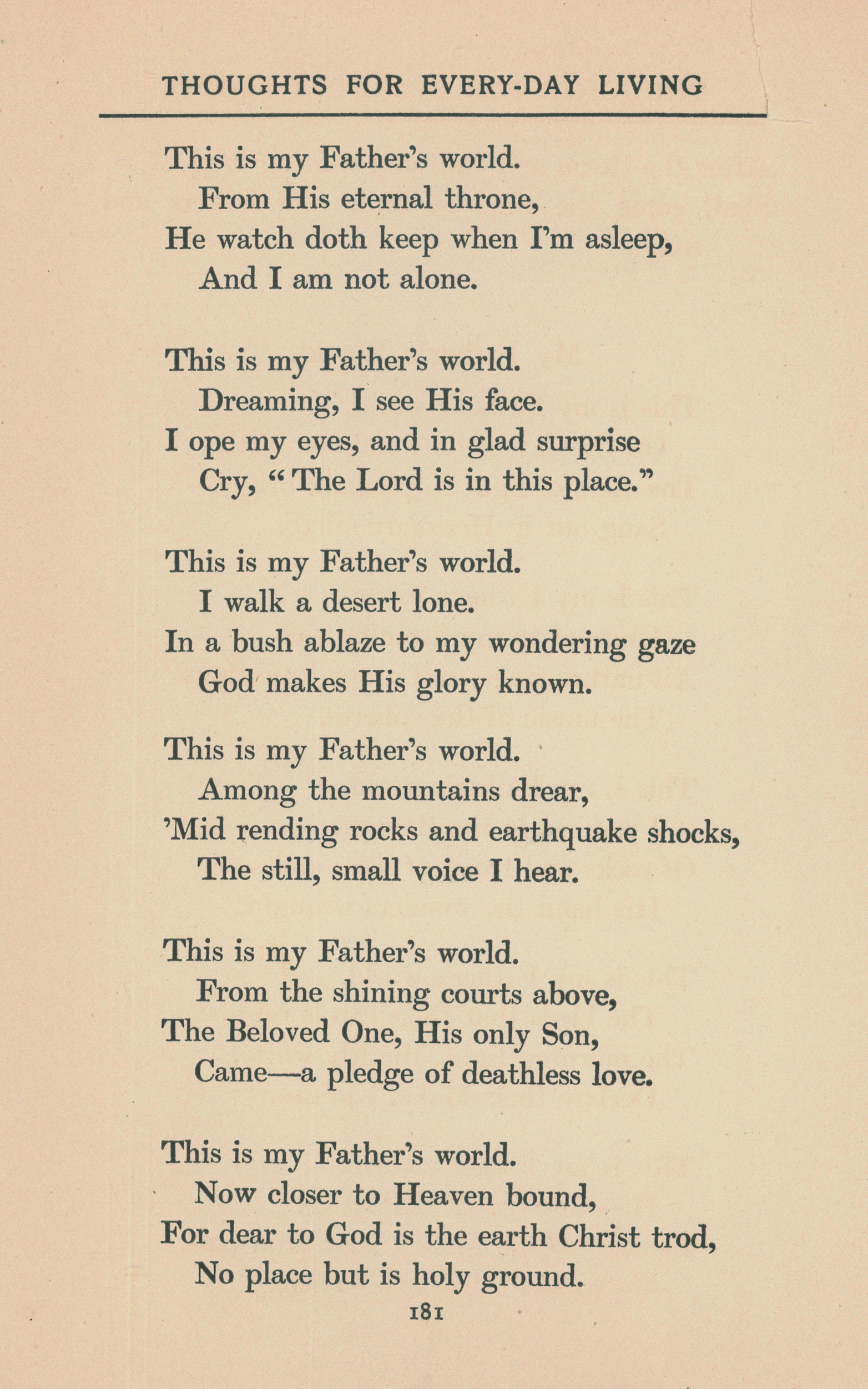This is my Father’s world
with
TERRA BEATA (TERRA PATRIS)
RUSPER
I. Text
This hymn is by Presbyterian pastor Maltbie Davenport Babcock (1858–1901), from his collection Thoughts for Every-Day Living (NY: C. Scribner’s Sons, 1901 | Fig. 1). The original form of the text was in sixteen stanzas of four lines, headed “My Father’s World,” without music.
Fig. 1. Maltbie D. Babcock, Thoughts for Every-Day Living (New York, C. Scribner's Sons, 1901).
Babcock also penned an essay, “The Father of Lights,” for this book, which explored this theme in other ways.
What the sun in the heavens is to the earth, that the Father is to us. Was there ever an act of unenlightened worship more dignified and exalted than his who, from his silent hilltop, watched the flushing east, and bowed before the great day-bringing, life-giving sun? . . . The blaze of a pine knot, the shining lamp, the glowing of coals or their reduction and refinement in jets of light, all are only the release of imprisoned sun shine. The gentle beauty of the rainbow, the blue of sky and sea, the endless joy of the flowers, the witchery of spring, the luxury of summer, the wealth of autumn, the flashing splendor of a snowy field, all bless the sun for their being. . . .
Every gift is from above to take our thoughts and thanks above. God’s gifts are to lift up our faces to His, to awaken us to love Him. Every bad and imperfect thing drags us down to darkness; every good and perfect gift woos us into the light. The birds and flowers are His appeal to trust; the stately order of the heavens, to symmetry and steadiness; the beauty of nature, to the beauty of holiness; the affections of earth, to the perfect love of which they are but dear fragments. And God be thanked for his supreme appeal—that good and perfect gift, the gift unspeakable: His life, His love, His very self in Jesus Christ (pp. 112–114).
In 1937, Methodist hymnologist Robert Guy McCutchan offered this story about Babcock, but did not say where he got it:
It is said that when Doctor Babcock, a great lover of nature, would frequently go in the early morning to the top of a hill north of Lockport, New York, his first pastorate, in order to get the full benefit of the fine view of Lake Ontario and the country lying between, he would say, “I am going out to see my Father’s world.”[1]
Babcock’s hymn is a meditation on God’s creative work, the echoes of his voice in creation, and the praise offered back to the Creator. Some scriptural allusions include the dawn of creation (Genesis 1) in stanza 1, possibly including the “morning stars” of Job 38:7, Jacob’s dream (Genesis 28) in stanza 7, the burning bush (Exodus 3) in stanza 8, the “still, small voice” (1 Kings 19:12) in stanza 9, and a promised rest (Matthew 11:28) in stanza 12. In hymnals, the text is usually reduced in length, typically starting with the second stanza, reformatted into groups of eight lines to make three double-length stanzas.
Hymnologist Armin Haeussler summarized the overall message of Babcock’s hymn in this way:
Babcock brings us the message of God’s presence, God’s personality, God’s power, and God’s purpose, through this inspired bit of verse. It is thus not a mere outburst of song about nature, but a seasoned appreciation, beautifully worded, of unfailing trust in the ways and judgments of God.[2]
II. Tune
The tune most commonly associated with Babcock’s text is TERRA BEATA (or TERRA PATRIS), adapted by Franklin L. Sheppard (1852–1930) for this text and first published in Alleluia (Philadelphia: Westminster Press, 1915 | Fig. 2). Sheppard and Babcock are reported to have been good friends.
Fig. 2. Alleluia (Philadelphia: Westminster Press, 1915).
Sheppard credited the tune as “Traditional English Melody,” and other sources say he had learned it in his childhood. Hymnologists believe this tune is related to the tune known as RUSPER, as in The English Hymnal (Oxford: University Press, 1906 | Fig. 3), edited and harmonized by Ralph Vaughan Williams (1872–1958).
Fig. 3. The English Hymnal (Oxford: University Press, 1906).
Both of these tunes have their roots in a song known as “The Merchant’s Daughter.” Ralph Vaughan Williams was a collector of folk tunes, he was part of the English Folk Song Society, and he sometimes contributed to the Journal of the Folk Song Society. Another prominent member of that community was Lucy E. Broadwood (1858–1929), who had printed a version of the song in the Journal, vol. 1, no. 4 (1902), pp. 160–161 (Fig. 4).
Fig. 4. Journal of the Folk Song Society, vol. 1, no. 4 (1902).
The melody of interest here is the first of the two, collected by Broadwood in 1893 from Henry Burstow, a lifelong resident of Horsham, Sussex, England. In the introduction to this issue of the journal, she described Burstow in more detail:
Mr. Henry Burstow, to whom I am indebted for most of the Sussex songs here given, was sixty-eight years old in 1893 when he sang them to me. He is a native of Horsham. . . . Mr. Burstow is well known in Sussex and parts of Surrey as a bell ringer, and he is also in great request as a singer. He is proud of knowing 400 songs, and keeps a valuable list of their titles, of which he allowed me to make a copy. . . . Many of the songs on Mr. Burstow’s list which by their titles promised to be amongst the very oldest ballads, were considered by him to be unfit for ladies’ ears, and, as he could not detach the tunes from the words, the airs unfortunately remain unnoted. Mr. Burstow learnt very many “old songs and [ballads] off shoemakers who were always singing at their work.” Others he learnt from labourers who often could not read. Some songs he learnt from his father and mother.[3]
Broadwood also published the song in her collection English Traditional Songs and Carols (1908), pp. 28–29 (Archive.org), with a piano accompaniment. In the preface to The English Hymnal (1906), RUSPER (No. 379) was acknowledged as coming from Lucy Broadwood, although it had clearly been adapted by Ralph Vaughan Williams to suit the needs of the hymnal. Rusper is about five miles from Horsham.
For another version of the song with a different melody, see the Journal, vol. 1, no. 4 (1902), pp. 222–223 (Archive.org). The Bodleian Libraries possess ten examples of “The Merchant’s Daughter” in their Broadside Ballads collection (online), classified under Roud Number 675, some of which date to the first half of the nineteenth century. The Vaughan Williams Memorial Library of the English Folk Dance and Song Society has also compiled several broadsides of the song, especially in their Lucy Broadwood Broadside Collection, and in notebooks of folk song collectors. The example below (Fig. 5), which is text-only (as is typical of these broadsides), appears in multiple archival collections, including the Bodleian Library, Bod20107 (Johnson Ballads 2674); Mitchell Library, Glasgow, Frank Kidson Broadside Collection, vol. 2, p. 5; and the Vaughan Williams Memorial Library, Lucy Broadwood Broadside Collection, p.15A.
Fig. 5. “Merchant’s Daughter, or Constant Farmer’s Son,” English broadside, publisher and date unknown (19th century).
by CHRIS FENNER
for Hymnology Archive
18 June 2019
rev. 1 May 2022
Footnotes:
Robert Guy McCutchan, “This is my Father’s world,” Our Hymnody: A Manual of the Methodist Hymnal, 2nd ed. (Nashville: Abingdon-Cokesbury Press, 1942), p. 103.
Armin Haeussler, The Story of Our Hymns: The Handbook to the Hymnal of the Evangelical and Reformed Church (Saint Louis: Eden Publishing House, 1952), p. 117.
Lucy E. Broadwood, “Introduction,” Journal of the Folk Song Society, vol. 1, no. 4 (1902): Archive.org
Related Resources:
Lucy E. Broadwood, ed., “The Merchant’s Daughter,” English Traditional Songs and Carols (London: Boosey & Co., 1908), pp. 28–29: Archive.org
William Chalmers Covert & Calvin Weiss Laufer, eds., “This is my Father’s world,” Handbook to the Hymnal (Philadelphia: Presbyterian Board, 1936), pp. 84–85.
William J. Reynolds, “This is my Father’s world,” Hymns of Our Faith (Nashville: Broadman Press, 1964), p. 210.
Joseph F. Green, “This is my father’s world: An interpretation,” Church Musician, vol. 31 (July 1980), pp. 13–14.
Marilyn Kay Stulken, Hymnal Companion to the Lutheran Book of Worship, “This is my Father’s world,” (Philadelphia: Fortress Press, 1981), pp. 559–560.
Milburn Price, “This is my Father’s world,” Handbook to the Baptist Hymnal (Nashville: Convention Press, 1992), pp. 255–256.
Paul Westermeyer, “This is my Father’s world,” Hymnal Companion to Evangelical Lutheran Worship (Minneapolis: Augsburg Fortress, 2010), pp. 700–702.
Carl P. Daw Jr. “This is my Father’s world,” Glory to God: A Companion (Louisville: Westminster John Knox, 2016), pp. 376–377.
Bodleian Libraries, Broadside Ballads Online, Roud Number 675: http://ballads.bodleian.ox.ac.uk/search/roud/675
English Folk Dance and Song Society, Vaughan Williams Memorial Library: https://vwml.org
“This is my Father’s world,” Hymnary.org:
https://hymnary.org/text/this_is_my_fathers_world_and_to_my


